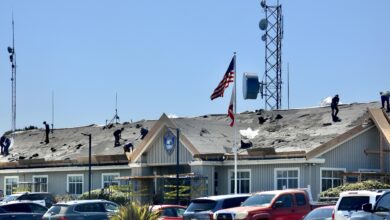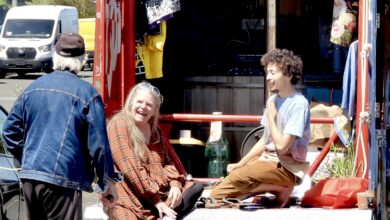MOCA hopes to awaken local plan for marine reserves
On Feb. 1, an interactive map showing new areas of the ocean off Mendocino County to close to fishing is “due.” By Nov. 30, nominations for the local people who wish to serve on a local stakeholders panel are also due
In an effort to complete this “homework” assigned by the Marine Life Protection Act Initiative (MLPAI) staff, local people have engaged in three lengthy meetings so far. Bi-weekly Monday meetings are foreseen in December and January.
The City of Fort Bragg launched this effort in September to facilitate local participation in the MLPAI process. On Monday, science teacher Jeanine Pfeiffer took over as facilitator of sometimes-contentious meetings. All the meetings have been comprised entirely of locals, who call each other by first names and, so far, not by anything worse.
By a unanimous vote, the group gave itself a name, the Mendocino Ocean Community Alliance (MOCA). The most argumentative member of the audience, Rex Gressett, owner of the San Juan in Noyo Harbor, joked he would go ahead and provide a “no” vote to the name just to keep up appearances.
Gressett walked out of the last meeting in protest of what he sees as a pro-fishing bent to the group. While the name was being debated, Gressett suggested “Industrial Fishing Lobby.”
The process has included many fishermen and seaweed harvesters but also includes members of the local Ocean Protection Coalition and a participant funded by the Natural Resources Defense Council.
Pfieffer teaches online environmental science courses for San Jose State University and is a part-time UC Davis research associate and guest lecturer.
On the other end of the spectrum from Gressett who thinks the MLPAI could help restore depleted ecosystems, some fishermen have suggested boycotting the process and some have left in frustration.
“People are cooperating with a totally corrupt process, that defies the laws of our democracy and makes the rules up as corporate sponsors see fit,” said David Gurney, after the meeting, summarizing his objections to a process that is extensively pre-defined despite its invitation to open participation.
Most of about 80 people who have come to the three meetings have expressed reservations about the MLPAI but want to create a proposal rather than let outsiders do it for them.
A single principle has been reiterated often and approved by most in the crowd; “do the most ocean preservation possible with the least economic impact possible.”
Finding that balance will be the task of working groups created Monday.
Working groups
One MOCA working group plans to design and submit an array by Feb. 1. MLPAI organizers have asked locals to come up with their own array, a connected chain of new areas to be closes to fishing, within requirements created by the 1999 law, a master plan created by the California Fish and Game Commission and rules created along the way by the private MLPAI group.
Any external array must include the entire North Coast area, which means locals will need to network with similar groups in Humboldt and Del Norte counties. Meetings to explain the process were held this week in Eureka. Compensation for some expenses and a small stipend is available to participants.
A second working group formed Monday, is tasked with bringing in scientific experts. The group hopes to attract Greg Grantham, head of the marine science program at College of the Redwoods, and perhaps an oceanography contingent from Humboldt State.
A third working group was created to draft a statement of purpose for MOCA.
MOCA plans to hear reports and launch these working groups at its next meeting, tentatively scheduled for Monday, Dec. 7. MCOA will meet on off-weeks from the Fort Bragg City Council, which meets the second and fourth Mondays of the month.
MOCA is also seeking to help identify about 10 people to serve on the local stakeholders group, which will hash out areas to close to fishing with the official science panel next spring and summer.
The local stakeholders group is expected to be composed of about 10 people from each of the three affected counties.
Mayor Doug Hammerstrom and City Manager Linda Ruffing led the first two meetings but had made it clear they wanted to find someone outside of government to be the facilitator. Councilman Jere Melo was at one meeting. Both were on hand for the third meeting, with Ruffing continuing to take notes and provide summaries of the meeting to the group.




